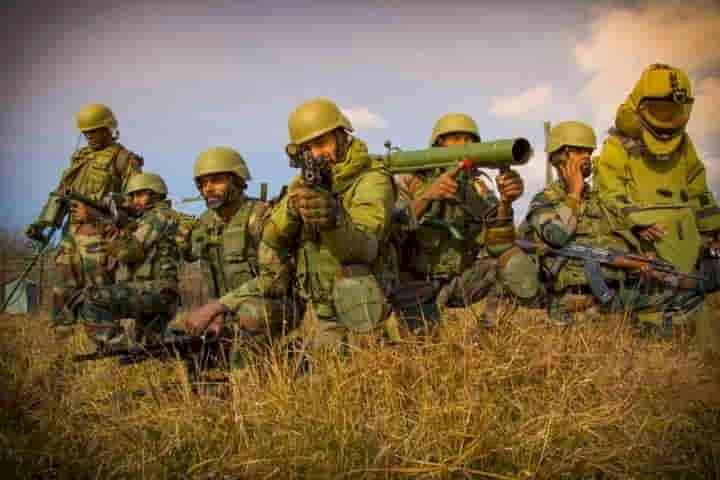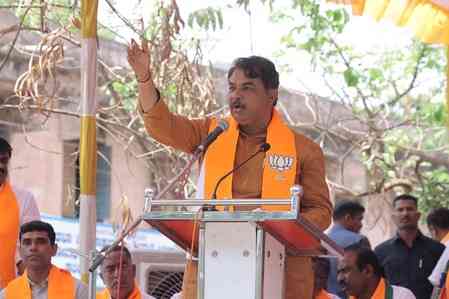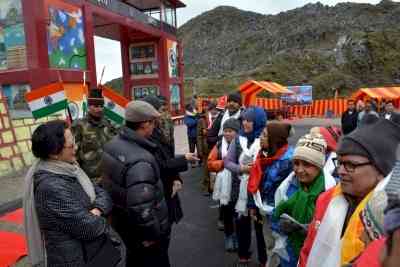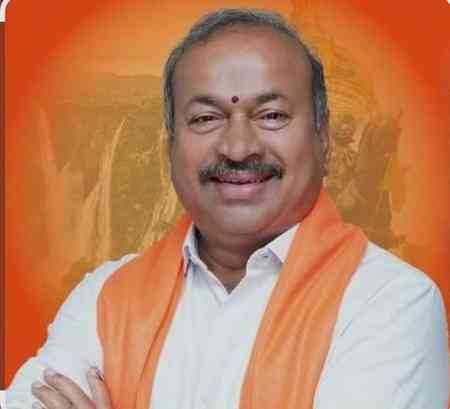Indian army's transition towards total deterrence showcased during Army Day
Today, the Indian Army is celebrating Army Day to commemorate the day when General K M Cariappa took over the command of Army from General Sir FRR Bucher, the last British Commander-in-Chief 0n 15 Jan 1949 and became the first Commander-in-Chief of Indian Army post Independence. He was the first Indian to be appointed as Commander-in-Chief.

By D.K. Pandey
New Delhi, Jan 15: Today, the Indian Army is celebrating Army Day to commemorate the day when General K M Cariappa took over the command of Army from General Sir FRR Bucher, the last British Commander-in-Chief 0n 15 Jan 1949 and became the first Commander-in-Chief of Indian Army post Independence. He was the first Indian to be appointed as Commander-in-Chief.
The Indian Army with a strength of over 1.4 million active personnel, is the world's second-largest military force. It also has the third-largest defence budget in the world.
"We have resolved to show "zero tolerance" to terrorism and is committed to extracting "dire costs" for it" Indian Army Chief Gen. MM Naravane said while referring to Pakistan's cross-border terror in Jammu and Kashmir. In a press conference ahead of the Army Day, he mentioned that the concentration of some 350 to 400 terrorists in terror launch pads and training facilities on the other side (Pakistani side) of the Line of Control (LoC) and repeated infiltration attempts "expose" the "nefarious intents" of the adversary.
The Indian Army will continue to deal with the Chinese PLA in a firm and resolute manner in Eastern Ladakh and it has been maintaining the highest level of operational preparedness in the region, Gen Naravane said. "We are much better prepared to meet any challenge that is thrown up at us," he said.
A limited progress has been achieved in the disengagement process along the LAC in the sensitive sector while negotiations for similar steps at other points remained deadlocked. Each side currently has around 50,000 to 60,000 troops in the area. Gen. Naravane said that the Indian Army is currently holding onto all important areas in the high-altitude region and it is ready to counter any contingency.
Modernisation
India is facing a multi-directional challenge from Western to Eastern borders, the Western Pacific to the Indian Ocean Region (IOR). In the last few years, military experts have frequently raised the necessity of rapid modernisation of the Indian armed forces to effectively deal with the dynamic strategic environment. The modernisation of the Indian Army has been going on without facing any difficulty, Army Chief Gen MM Naravane has said. He has dismissed the apprehensions that the need for devoting more resources to guard the LAC in the face of the prolonged standoff with China in eastern Ladakh may starve the force of funds for buying new weapons and platforms.
The Government of India has initiated several measures to give impetus to Prime Minister Narendra Modi's call for 'Aatmanirbharta' and indigenisation of products in all spheres. Further, the embargo upon the import of 209 defence equipment means that they would be indigenously developed in India. Specific efforts have been made to indigenise the Indian defence industry, and to reduce the huge import bill of the defence products, which were well received by the industry.
Drones will form an important component of future wars. The army is getting 10 American MQ-9 Reaper drones. Indigenous platforms like Rustom-2 will be inducted soon. DRDO has developed an anti-drone system. This will be deployed along with some Israeli systems. Thus in 3 to 4 years, the Indian Army will have a robust Anti-Drone system established at its bases and border areas.
The need for light tanks was felt during an ongoing standoff with China. There is a plan to procure 400 light tanks. There is the possibility of taking Russian Sprut light tanks in limited numbers and filling up the remaining numbers by indigenous light tanks of DRDO or some private company.
The armoured corps will consist of T-90 and Arjun Tanks. T-72 will start retiring and the army will start induction of FRCV (Future Ready Combat Vehicles) from 2030 onwards. These will be the next-generation main battle tanks.
The army is working on a field artillery rationalization plan in a big way. All field artillery guns are to be made of 155 mm calibre. These guns are to be inducted into various categories. Firstly 155 mm towed artillery guns are required. The Army is likely to purchase 400 Israeli Athos and the remaining 1100 units of indigenous ATAGS (Advanced Towed artillery guns system). In tracked guns, the Army is already inducting K-9 Vajra. Induction of multi-barrel rocket launchers, Pinaka Mk 1A and the guided version of the Pinaka rocket launcher are in pipeline.
(Dr D.K. Pandey is Professor (Aviation) at Galgotias University. He retired from the Indian Air Force as Group Captain. The views expressed are personal)
(The content is being carried under an arrangement with indianarrative.com)
--indianarrative


 IANS
IANS 










